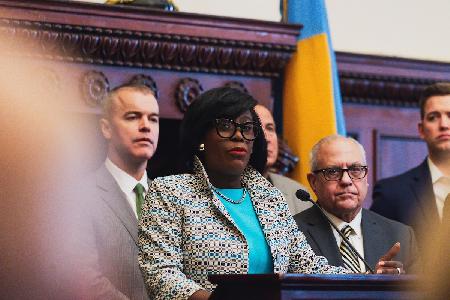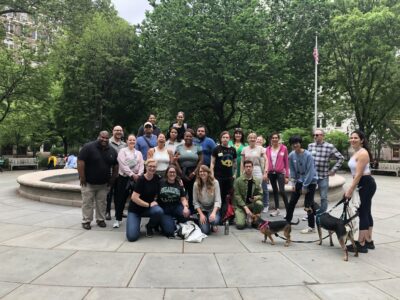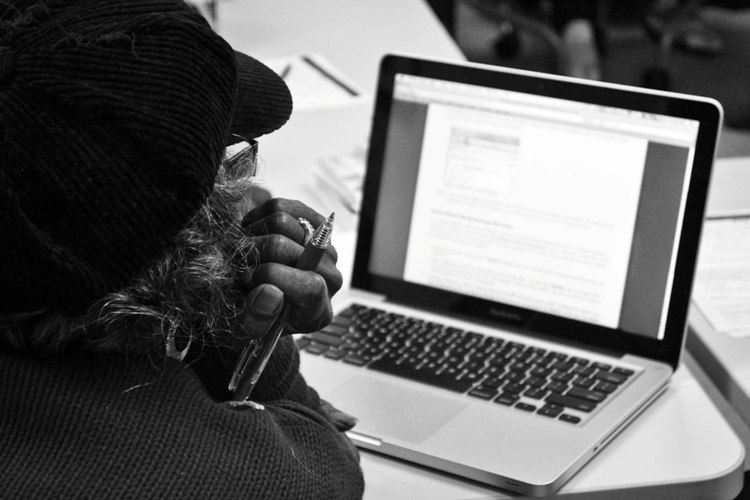One year after launching weekly digital literacy trainings, poverty-empowerment nonprofit LIFT-Philadelphia, partnered with economic development group Philadelphia OIC and Comcast, says it has brought 700 Philadelphians through the program. In a city where some 200,000 residents are in so-called ‘deep poverty,’ the numbers can seem small. But as the economy hurtles into technology adoption, where else can job readiness programs focus?
Understand, neither LIFT, nor half-century-old OIC have technology in their mission, nor is digital literacy a major goal. OIC was founded by Civil Rights activity Leon Sullivan in 1964, and LIFT-Philadelphia is branch of a national anti-poverty group that pairs low-income community members with volunteers who assist them find secure housing, employment, taxes and referrals for services such as childcare and healthcare.
But the need has only grown and a shared goal has brought these groups together.
In 2011, as Comcast’s FCC-mandated Internet Essentials low-cost broadband program struggled to get off the ground here in Philadelphia, its outreach team partnered with staff at the legendary North Philadelphia institution OIC, who in turn connected the Internet Essentials to LIFT-Philadelphia. The goal was to find at-risk Philadelphians who could benefit with having cheap Internet access. But if you don’t know how to use any of the powerful tools online, what’s the point?
The three formed a partnership in early 2012 and now say they have trained more than 700 people on basic digital literacy topics such as how to browse the web, how to email and how to create a resume online. Usually averaging 20 attendees, classes are held at LIFT’s West Philadelphia office at 56th and Chestnut streets on Mondays at 1 p.m. and at the OIC building at Broad and Thompson streets on Tuesdays and Thursdays at 1 p.m. until 2:30 p.m.
“I don’t know that we can solve unemployment or any of these significant societal problems,” Robert Smith, vice president of community investment at Comcast Freedom Region, said. “But we’re uniquely positioned to make a dent in the digital literacy and the broadband adoption side of things that can at least put residents in a position to succeed.”
As KEYSPOT, the citywide public-private coalition of computer literacy centers and programs, has fought for post-stimulus funding survival, earning a modest earmark in the latest city budget, this LIFT partnership has struck out on its own, seeking private funding and partnering with Comcast.
It’s something that comes with a patchwork of nonprofits, community groups, senior and recreation centers and city service outfits trying to bridge the digital divide.

The Executive Director of LIFT-Philly, Josh Romalis, talked of the importance of the computer class. Photo by Julie Smith for Technically Philly
Josh Romalis, executive director of LIFT-Philadelphia, said with Comcast’s funding and promotion of the program, OIC’s training and computer resources and LIFT’s strong relationships between its volunteers and clients, the program has been successful in providing attendees with the necessary resources.
“It’s a real gap in our clients’ knowledge base,” Romalis said. “Either they weren’t brought up with computers, or they didn’t have a chance to really use them in work or at home. The opportunity to do the one on one work here at LIFT but also learn more on their own in these own classes was great.”
Smith, who said Comcast and LIFT became close quickly due to the sincerity of the organization and its mission, said the program can help guide clients to their individual goals.
“Digital literacy training, whether it’s the classes we provide or others’, help people find something about the Internet that is relevant to them,” he said.

LIFT-Philly online literacy class student Yohanis Simpson explained his personal reasons for wanting to learn how to use the computer. Photo by Julie Smith for Technically Philly
After both of his parents became sick, Yohanis Simpson said he put his plans of improving his computer skills on hold. But after coming across an ad for the free digital literacy classes in the newspaper, he said he decided to learn.
Simpson, who said he had no training with computers beforehand, needs to use them occasionally at his job in healthcare. However, his main goal, he said, is to create a website to advertise his innovations in chess.
“It’s harder for me to grasp the things, but I do recognize the importance of having the knowledge. That’s what I’m trying to do with my third of my life that I have,” Simpson said. Through LIFT, Simpson said he also received resources on inexpensive Internet services.
JaRon Burnett is the lead instructor for Philadelphia OIC’s Neighborhood Opportunity for Mobile Accessible Destinations program. He provides students with skills on how to operate computers, use the Internet, fill out applications and use Microsoft Office. The goal, he said, is to provide clients with enough information for them to continue to learn new skills on their own.
“You may have skills, and you may have expertise,” Burnett said, “but if you don’t have any computer skills in this day and age, your options of exploiting those skills and taking advantage of that expertise lessens.”
The classes provide opportunities for people to be on a level playing field, said Alejandra Tarquino, site coordinator at Lift-Philadelphia. Tarquino, who handles office management and develops ways to measure the quality of LIFT’s services, is in charge of the computer classes.
“We believe that training people on how to use computers and also allowing some space for them to use them is a way to help them obtain services for themselves,” Tarquino said. “It’s a way to help our clients feel more self sufficient.”
“Part of why I love working with the computer classes is I just see how empowered people are after learning those new sets of skills and how happy and self-sufficient they are,” she said. Tarquino said LIFT is developing ways to receive feedback from clients in order to modify its services for what the community needs.
Dennis Kamara said he had no experience with computers and that he was “scared” of them before enrolling in the classes. Originally from Africa, Kamara said when he got to the United States, he realized the importance of digital literacy when seeking a job.
“America today, if you don’t have computer knowledge, it’s very terrible for you,” Kamara said. He said he credits the classes for landing him a job in security that he applied for online.
Kamara said his family remains in Africa, and his main goal now is to get his own computer in order to communicate with them more often and see them while they’re talking.
“LIFT is a place where one can learn plenty of things,” Kamara said. “They are very interested in people like us, who are old and who don’t know much about computers.”
Join the conversation!
Find news, events, jobs and people who share your interests on Technical.ly's open community Slack

Philly’s IT department fires long-tenured staff amid a high-level shakeup of priorities

Why is it so hard to find entry-level software engineering jobs?

This Week in Jobs: Get out there with 22 new job opportunities available to you!

